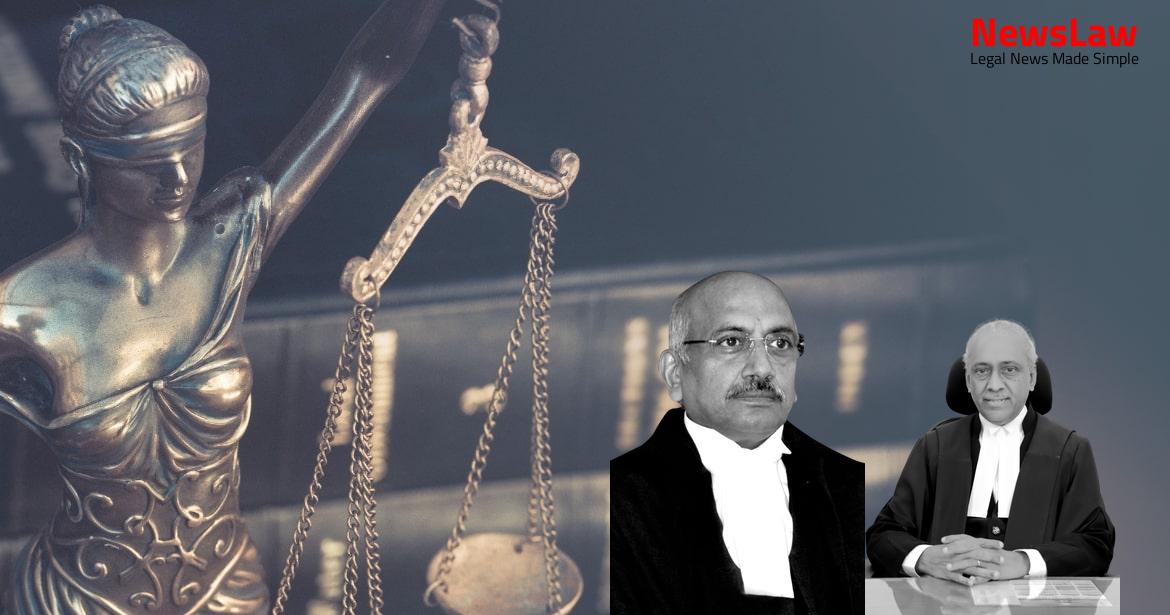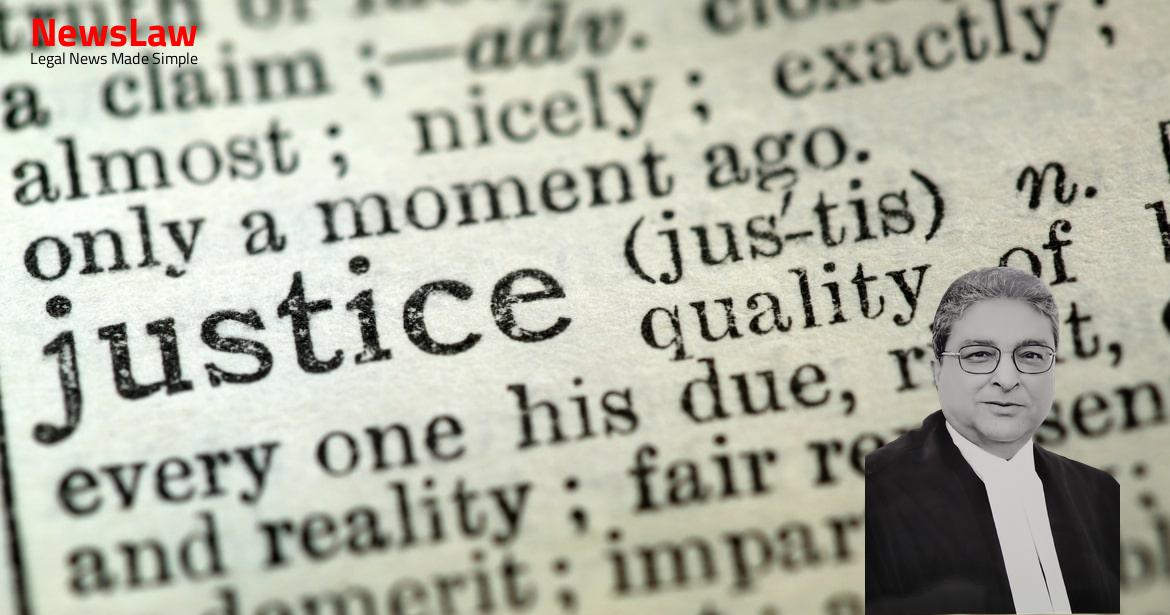Delve into the legal nuances of the case between Rabindranath Bose and Union of India, where the Supreme Court emphasized the importance of timely action in legal matters. The judgment sheds light on the implications of delays and laches on equitable relief, offering valuable insights into the complexities of judicial discretion and the impact of procedural lapses on petitioner rights.
Facts
- An advertisement was issued on 09.09.2012 for LPG distributorship at Jamalpur, District Burdwan.
- Both the current appellant and the current respondent were found to be eligible applicants.
- The current appellant was selected after a draw of lots held on 11.05.2013.
- Four years later, the respondent raised a complaint alleging the appellant’s land was Barga land.
- The main issue in the appeal is whether the writ court was right in entertaining the petition challenging the approval granted to the appellant in 2014.
- The petitioner filed a writ petition in 2017, contesting the allotment in favor of the appellant and raising concerns over the alternate land offered for construction.
- The court set aside the allotment made in favor of the appellant, making all related documents and permissions null and void.
- The intra-court appeal was filed due to aggrievement by the decision.
- The appellate court allowed the appeal citing reasons:
- The successful applicant did not offer unencumbered land for construction of godown and showroom.
- The land offered by the appellant violated specific clauses in the guidelines for selection of regular LPG Distributors.
- The amendment to the guidelines could not be applied retrospectively.
Also Read: Bail Application Rejected: Analysis of UAP Act Bail Provision
Arguments
- The appellant had already submitted an application for accepting the alternate land offered and the request was processed, allowing the construction of a godown and showroom on the alternate land.
- The Division Bench ignored these facts and proceeded to accept the plea of the writ petitioner without considering the delay and latches exhibited by the petitioner.
- The Division Bench’s decision was based on surmises and conjectures, not on factual evidence.
- The impugned order should be set aside, and the writ petition dismissed by the Learned Single Judge should be upheld.
- The Corporation’s Senior Counsel agreed that the appellant was successful in the allotment process through draw of lots and the request for alternate land was accepted, leading to the construction being permitted.
- The subsequent notification by the appropriate government clarified the position on offering alternate land, which the Corporation acted upon in this case.
- The Corporation permitted construction in good faith and the building of the godown and showroom was completed as per the permission granted.
- The appellant’s counsel argued that the writ petition was rightly dismissed by the Learned Single Judge due to lack of locus standi of the writ petitioner and the dissolution of the interim order.
- The issue of delay in filing the Writ Petition was rightly ignored by the Division Bench due to the blatant violation of guidelines at the root of the matter.
- Amending guidelines post the advertisement in question was unacceptable as it changed the rules after the game had begun.
- The appeal should be dismissed as the delay and laches alone should lead to non-suiting the applicant.
- A belated approach to the court, after sleeping over rights for a long time, does not warrant extraordinary relief.
- This Court has previously emphasized that delay undermines justice and equity.
- High Courts must consider delay and latches in deciding on exercising discretionary powers under Article 226 of the Constitution.
- A High Court may refuse to use its extraordinary powers if the applicant’s laxity allowed the cause of action to fade away and later tries to revive it.
- The discretion to be exercised should be done with care and caution, considering the reasons for the delay.
- While there is no fixed period for filing a writ petition, it must be done within a reasonable time for the court to consider it.
- Submitting memorials cannot revive a dead cause of action or one that has naturally expired.
Also Read: Analysis of Circumstantial Evidence in Murder Case
Analysis
- The appellant has the right to succeed based on the petitioner’s acquiescence in the Corporation’s acts.
- The alternate land offered met the specifications and was deemed suitable by the Corporation.
- Delay and laches on the part of the petitioner can result in the dismissal of the petition.
- The need for flexibility in guidelines led to the allowance of alternate land offers.
- Procrastination and inactivity from the petitioner are criticized in the judgment.
- The court emphasizes the importance of timely action when invoking writ jurisdiction.
- Inordinate delays in seeking writs can lead to a refusal of discretionary jurisdiction.
- The approval of the alternate land for construction was based on a thorough evaluation.
- The court warns against belatedly resorting to extraordinary remedies due to potential injustices.
- A balance between explanation and acceptability must be achieved in writ court proceedings.
- The eligibility of the land was determined based on ownership status, not on material conditions like ‘Barga’ status.
- Awareness of developments and failure to challenge in a timely manner can impact the outcome of a case.
- In the case of Rabindranath Bose v. Union of India, it was observed that approaching the court under Article 32 after inordinate delay without a reasonable explanation may disentitle the petitioner from relief.
- The court exercises discretion judiciously and reasonably while considering such cases, bearing in mind its extraordinary and equitable jurisdiction as a constitutional court.
- Delay is seen as a barrier to equity, especially when it prejudices the other party or seems like a waiver of rights by the petitioner.
- The length of delay and the actions taken during the delay period that may affect both parties are crucial factors in deciding whether to grant relief or not.
- Laches is a principle not to encourage stale claims or resurrect settled matters or rights of third parties.
- The High Court may use its discretion to refuse to intervene if there is negligence or omission on the part of the applicant in asserting their rights, coupled with delay and prejudice to the opposite party.
- The High Court may decline relief, even in cases of infringement of fundamental rights, if there is inordinate delay without a satisfactory explanation.
- The doctrine of delay and laches should not be disregarded lightly, but each case will depend on the nature of the breach and the remedy sought, as well as the timing and reasons for the delay.
Also Read: Consolidation of FIRs in Multi-State Fraud Case
Decision
- FVC conducted on original land offered by Respondent No. 9 found satisfactory
- Request for provision of alternate land accepted based on satisfactory FVC results
- Division Bench’s order set aside
- Single Judge’s order restored
- Appeal allowed with no costs
Case Title: MRINMOY MAITY Vs. CHHANDA KOLEY (2024 INSC 314)
Case Number: C.A. No.-005027-005027 / 2024



